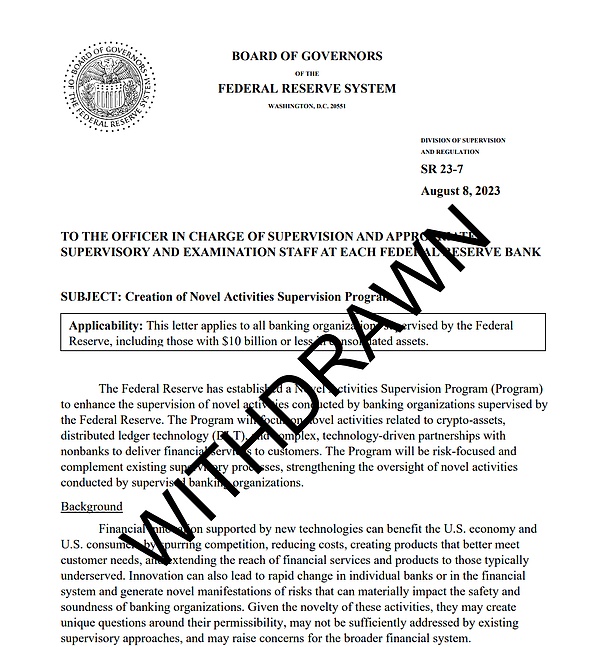The Federal Reserve announced the closure of the "Novel Activities Supervision Program" established in 2023, integrating the regulatory functions of crypto- and fintech-related banking activities back into the regular regulatory process.
On Friday local time, the Federal Reserve announced that it had closed its "Novel Activities Supervision Program" established in 2023, part of which was to strengthen the supervision of cryptocurrency business in the banking industry.

(Source: Federal Reserve)
This move is also the latest continuation of the recent gradual change in the stance of US regulators towards the crypto industry.
In a brief statement, the Federal Reserve Board of Governors said:“Since the Board initiated its supervisory program for certain crypto and fintech activities in the banking industry, the Board has deepened its understanding of these activities, the associated risks, and banks’ risk management practices. Therefore, the Board is integrating this knowledge and supervision of these activities into its standard supervisory processes and rescinding the supervisory letter that established the program in 2023.”
This short-lived program was introduced against the backdrop of the U.S. banking crisis that broke out in 2023.Three U.S. banks with close ties to the cryptocurrency industry - Silicon Valley Bank (SVB), Silvergate Bank, and Signature Bank - collapsed one after another. The Federal Reserve believes that closer attention needs to be paid to the risks that innovative and unproven technologies may pose to the banking system. Of course, the latest requirements simply simplify the compliance procedures for banks engaging in crypto business; core regulatory principles such as anti-money laundering and consumer protection remain unchanged. Prior to this, the crypto industry had accused US regulators of deliberately "blocking" their ties with the banking industry. This year, with the inauguration of Trump, a pro-cryptocurrency president, the regulatory climate has shifted dramatically. In April, the Federal Reserve withdrew its guidance requiring banks to obtain regulatory approval before conducting new crypto business. The other two U.S. federal bank regulators, the Office of the Comptroller of the Currency (OCC) and the Federal Deposit Insurance Corporation (FDIC), have also taken similar measures, allowing banks to decide for themselves whether to conduct crypto business under existing risk management requirements. Then, in July of this year, the three regulators issued a joint statement providing guidance on how banks can provide cryptocurrency custody services. The guidance describes custody as holding digital assets on behalf of customers, while emphasizing that this does not create new regulatory requirements.
 Edmund
Edmund









